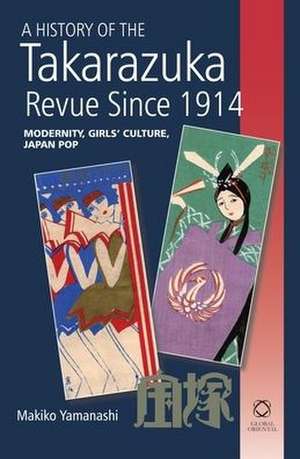A History of the Takarazuka Revue Since 1914: Modernity, Girls' Culture, Japan Pop
Autor Makiko Yamanashien Limba Engleză Hardback – 13 mai 2012
Furthermore, because of its unique features as an all-female performance art appealing mostly to female Japanese audiences, the study also includes an in-depth consideration of its continuing success, way of life and wider social impact from both cultural and social perspectives.
With Takarazuka’s centenary fast approaching, A History of the Takarazuka Revue Since 1914 will have wide interdisciplinary appeal, as well as in the particular context of Japanese Studies. Illustrated throughout, supported by an extensive bibliography, it is divided into five chapters: l. The Formative Years of Takarazuka; 2.The Mechanisms of Takarazuka; 3. The Stage Art of Takarazuka ‘Fantasy Adventure’; 4. The Taishō ‘Modern’; in the Female Domain of Shōjo Bunka; 5. Takarazuka in the Modern Heritage of Girls’ Culture and Beyond.
Preț: 562.51 lei
Preț vechi: 685.99 lei
-18% Nou
Puncte Express: 844
Preț estimativ în valută:
107.65€ • 116.89$ • 90.43£
107.65€ • 116.89$ • 90.43£
Carte indisponibilă temporar
Doresc să fiu notificat când acest titlu va fi disponibil:
Se trimite...
Preluare comenzi: 021 569.72.76
Specificații
ISBN-13: 9789004203860
ISBN-10: 9004203869
Pagini: 28
Dimensiuni: 155 x 235 x 18 mm
Greutate: 0.84 kg
Editura: Brill
Colecția Brill
ISBN-10: 9004203869
Pagini: 28
Dimensiuni: 155 x 235 x 18 mm
Greutate: 0.84 kg
Editura: Brill
Colecția Brill
Notă biografică
Makiko Yamanashi holds a degree in art history and philosophy from UCL. She belongs to the Opera/Musical Study Group at the Tsubouchi Theatre Memorial Museum, Waseda University, and also works as a coordinator of cultural events in Japan and Europe. In Takarazuka City, she acts as a member of the Takarazuka Film Festival Committee and the Takarazuka International Friendship Association.
Recenzii
„Makiko Yamanashi erhellt die Geschichte des Takarazuka-Theaters, das in den Zeiten des japanischen Imperialismus auch zu Propagandazwecken missbraucht und unter anderem für mehrere Tourneen in der besetzten Mandschurei eingesetzt wurde. Die Autorin gibt, und dies macht die Lektüre besonders wertvoll, einen Einblick in die sozialen Hintergründe und die Gender-Aspekte der Revue, die zu Unrecht bisher noch nicht als eine eigenständige Tradition der japanischen Populärkultur anerkannt worden ist.“
Neue Züricher Zeitung, (14.07.12 / Nr.162 / Seite 56 / Teil 01)
Neue Züricher Zeitung, (14.07.12 / Nr.162 / Seite 56 / Teil 01)
